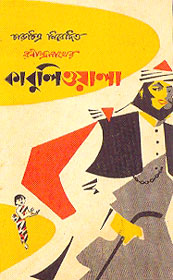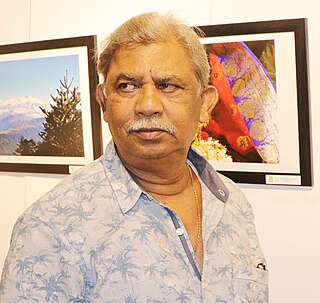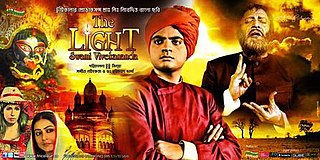Related Research Articles

Galpo Holeo Satti is a 1966 comedic Bengali film written and directed by Tapan Sinha. It stars Bhanu Banerjee, Jogesh Chatterjee, Bharati Devi, Chaya Devi, Ajoy Ganguli, Rabi Ghosh, Rudraprasad Sengupta. Later the film remade in Hindi as Bawarchi (1972), in Tamil as Samayalkaaran (1974) and in Kannada twice as Sakala Kala Vallabha and No 73, Shanthi Nivasa (2007).

Kabuliwala is a 1957 Bengali film directed by Tapan Sinha and based on the eponymous 1892 short story by the Bengali writer Rabindranath Tagore.

Tapan Sinha was one of the most prominent Indian film directors of his time forming a legendary quartet with Satyajit Ray, Ritwik Ghatak and Mrinal Sen. He was primarily a Bengali filmmaker who worked both in Hindi cinema and Bengali cinema, directing films like Kabuliwala (1957), Louha-Kapat, Sagina Mahato (1970), Apanjan (1968), Kshudhita Pashan and children's film Safed Haathi (1978) and Aaj Ka Robinhood. Sinha started his career in 1946, as a sound engineer with New Theatres film production house in Kolkata, then in 1950 left for England where he worked at Pinewood Studios for next two years, before returning home to start his six decade long career in Indian cinema, making films in Bengali, Hindi and Oriya languages, straddling genres from social realism, family drama, labor rights, to children's fantasy films. He was one of the acclaimed filmmakers of Parallel Cinema movement of India.
Hansuli Banker Upakatha is a film by Tapan Sinha based on the novel by Tarashankar Bandopadhyay, in 1962. The film under the Jalan Productions starred Kali Bannerjee, Dilip Roy, Rabi Ghosh and others. Set in 1941, the movie explores life in rural Bengal, the realities of the Zamindari system that was responsible for much of the social inequalities in Bengal, as well as the changes in social perceptions with time.

Satabdi Roy (born 5 October 1969) is an Indian actress, film director and politician. As an actress she is known for her work in Bengali cinema. She is the recipient of BFJA Awards for two times. As an actress, she ruled the array of commercial Bengali cinema during the late 1980s and 1990s. As a director, she has been denounced critically for her use of superfluous themes. She is a Trinamool Congress Member of Parliament, Lok Sabha since 2009.

Sagina Mahato is a 1970 Bengali film produced by Shri J. K. Kapur and directed by Tapan Sinha. The film stars Dilip Kumar and Saira Banu, two acting giants of Indian cinema. The film is based on the true story of the labour movement of 1942–43, told through with fictional characters, and the mock trial of Sagina Mahato, the trade union leader of a factory in Siliguri. It was entered into the 7th Moscow International Film Festival. The film was shot on locations in Kurseong, near Darjeeling. A diamond-jubilee hit, it created box-office records in Bengal. The film was remade as a Hindi film titled Sagina in 1974, by Sinha with the same leads, produced by the same producers team J.K. Kapur and Hemen Ganguly, though this version wasn't commercially successful. Film music composed by playback singer Anup Ghoshal.

Cinema of West Bengal, also known as Tollywood or Bengali cinema, is the segment of Indian cinema, dedicated to the production of motion pictures in the Bengali language widely spoken in the state of West Bengal. It is based in the Tollygunge region of Kolkata, West Bengal, India. The origins of the nickname Tollywood, a portmanteau of the words Tollygunge and Hollywood, dates back to 1932. It was a historically important film industry, at one time the centre of Indian film production. The Bengali film industry is known for producing many of Indian cinema's most critically acclaimed global Parallel Cinema and art films, with several of its filmmakers gaining prominence at the Indian National Film Awards as well as international acclaim.

Jhinder Bondi is a 1961 Indian Bengali-language historical drama film produced by Bholanath Roy under his banner B.N Productions and directed by Tapan Sinha, starring Uttam Kumar, Soumitra Chatterjee, Arundhati Devi and Tarun Kumar in lead roles. Uttam Kumar played dual role in this film. Film music was composed by Ustad Ali Akbar Khan.

Raja Sen is an Indian film and television director and the winner of three National Film Awards from Kolkata, West Bengal, India. He is the father of Subhasree Sen and Sreyoshri Sen.

Manoj Mitra is an Indian theatre, film and television actor, director and playwright.
Hatey Bazarey or Hate Bazare is a 1967 award-winning art film by noted Bengali director Tapan Sinha. Produced by Asim Dutta, the story revolves around the conflict between good and evil. The film stars Ashok Kumar, Vyjayanthimala and Ajitesh Bandopadhyay in the lead with Bhanu Bandopadhyay, Samit Bhanja, Rudraprasad Sengupta and Gita Dey as the ensemble cast of the film. The film was produced by Priya Entertainment Production Limited owned by Asim Dutta.
Arundhati Devi was an Indian actress, director, writer and singer who is predominantly known for her work in Bengali cinema.
Apanjan, or simply Aponjon is a 1968 Indian Bengali language socio-political drama film directed by Tapan Sinha. The film is produced by R.K Kapoor under the banner of K.L Kapoor Productions and is based on a short story written by Indra Mittra, which itself was inspired from the political violence taken place in West Bengal. It consists of an ensemble cast of Chhaya Devi, Swarup Dutta, Samit Bhanja, Mrinal Mukherjee, Partho Mukherjee, Kalyan Chatterjee and Shyamal Banerjee in lead roles, with Bhanu Bandopadhyay, Rabi Ghosh, Chinmoy Roy and Dilip Roy in extended cameo appearances. The soundtrack of the film is composed by Tapan Sinha himself. Set against the backdrop of the political violence that rocked India, and West Bengal in particular, in the late 1960s, it tells the story of an aged widow in a village who goes to Calcutta to stay with relatives, but faces only exploitation. She moves to a slum, and finds her "own people" in a group of educated, unemployed youth, who are caught up inexorably in the prevalent violence.

The Light: Swami Vivekananda (2013) is a bilingual film directed by Utpal (Tutu) Sinha and produced by Tri Colour productions private limited. The film is based on the life and teaching of Swami Vivekananda. The film was a tribute to Vivekananda on the 150th anniversary of his birth. The film was dubbed in 18 languages.
Adalat o Ekti Meye is a 1981 Bengali feature film directed by Tapan Sinha, starring Tanuja in the lead role. For its powerful and sensitive presentation of rape and its effects on the life of a woman, it won the National Film Award for Best Feature Film in Bengali. In later years, it has come to be regarded as a landmark feminist film.

Ekhoni is a 1971 Bengali film directed by Tapan Sinha, starring Aparna Sen, Moushumi Chatterjee, Chinmoy Roy and others. Based on the award-winning novel of the same name by Ramapada Chowdhury, Ekhoni was one of the earliest films to address the problems of urban youth, and to replace the individual hero by a collective protagonist. At the 19th National Film Awards, it won the National Award for Best Screenplay. It also won two BFJA Awards.

Atithi is a 1965 Bengali drama film based on a short story by Rabindranath Tagore, and directed by Tapan Sinha. It tells a simple story about a teenage boy who prefers the life of a wanderer to the confines of a domestic life. At the 13th National Film Awards, it won the National Award for the Second Best Feature Film. It also won several BFJA Awards. It was India's competitive entry at the Venice International Film Festival in 1966, where it was nominated for the Golden Lion. The film was remade in Hindi as Geet Gaata Chal.
Antardhan is a Bengali thriller drama film directed by Tapan Sinha and produced by Naba Kumar Chandra based on a true story of the disappearance of a lady written by Dibyendu Palit. This film was released in 1992 under the banner of Indrapuri Studiio. This is the debut film of Bengali actor Sabyasachi Chakraborty.
Partho Mukherjee (Hindi: पार्थ मुखर्जी; Bengali: পার্থ মুখার্জী) was an Indian actor who worked in Bengali cinema. mainly as supporting actor. He has worked in movies like Dhanyee Meye, Agnishwar, Amar Prithivi, Bagh Bondi Khela. He is particularly known for his boy-next-door looks. He works with actors like Sabitri Chatterjee, Ranjit Mallick, Uttam Kumar, Soumitra Chatterjee etc. Beside acting on films, he is also a passionate singer.
Atanka is a 1986 Indian Bengali language political crime thriller film directed by Tapan Sinha. The film stars Soumitra Chatterjee, Prosenjit Chatterjee, and Satabdi Roy in her debut film. The film was known for its dark-tone and outstanding performances of the cast. The film ran for around 90 consecutive days at Mitra cinemas, west Bengal. The film was both critically and commercially successful and won 7 awards, and got an official entry at the Indian Panorama Section.
References
- ↑ "A master storyteller". India Today. 2009-01-30. Archived from the original on 2024-08-09. Retrieved 2024-08-09.
- ↑ "Bilingual E-archive Digital Platform for Bengal's Cinema". Bengal Film Archive. Archived from the original on 2024-08-18. Retrieved 2024-08-09.
- ↑ "Kalamati (1958)". Indiancine.ma. Archived from the original on 2024-09-06. Retrieved 2024-08-09.
- ↑ "Movie: Directors-Filmmakers : Noted Bengali Personalities : Tapan Sinha". www.bangalinet.com. Archived from the original on 2024-08-09. Retrieved 2024-08-09.